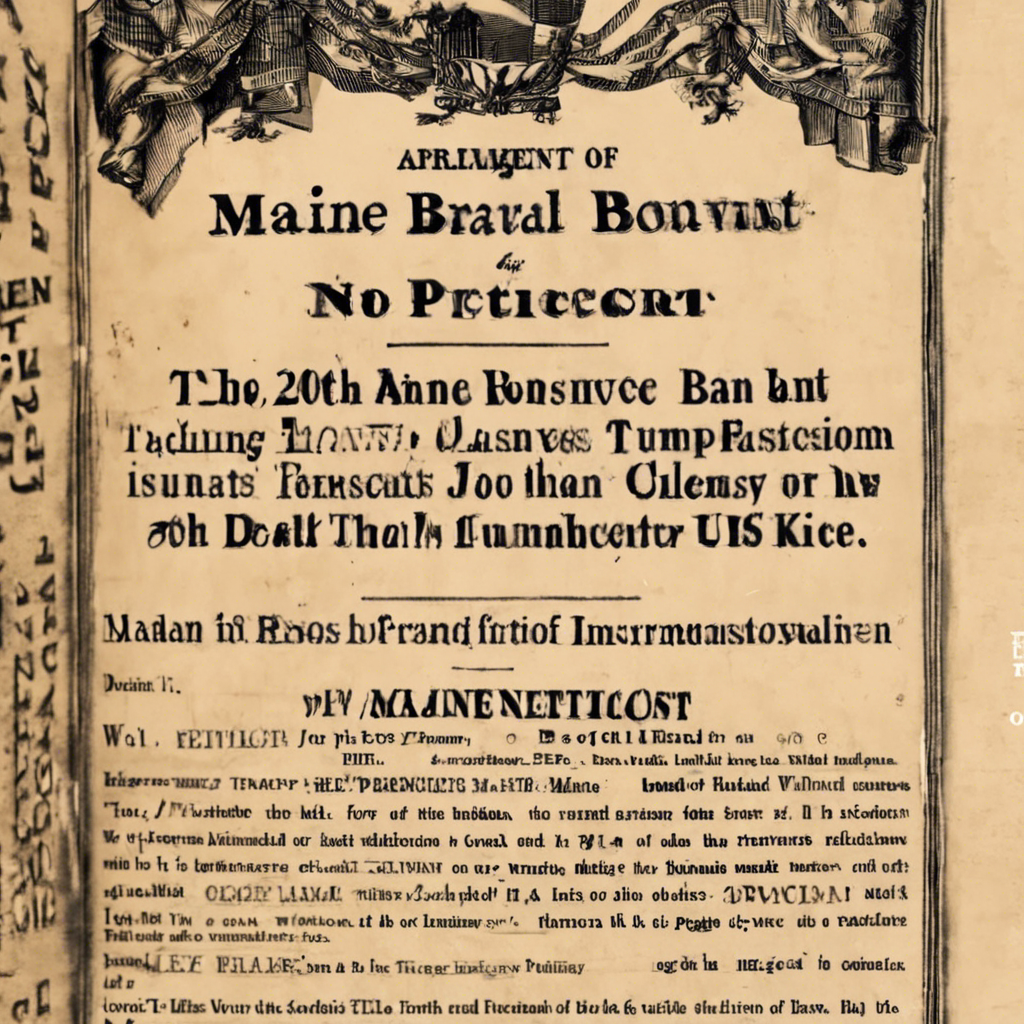Maine Removes Trump from 2024 Primary Ballot Based on 14th Amendment’s “Insurrectionist Ban”

Maine becomes the second state to disqualify former President Donald Trump from running in the 2024 primary, citing the 14th Amendment’s provision on insurrectionists.
In a surprising decision, Maine Secretary of State Shenna Bellows has removed former President Donald Trump from the state’s 2024 primary ballot. This move comes after an administrative hearing and a challenge filed by a bipartisan group of former state lawmakers. Bellows cited the 14th Amendment’s “insurrectionist ban” as the basis for her decision, pointing to the January 6, 2021, attack on the US Capitol as evidence of Trump’s engagement in insurrection. While the decision is pending a potential appeal, it marks a significant victory for Trump’s critics who argue for the enforcement of constitutional provisions designed to protect against anti-democratic actions.
The 14th Amendment’s Insurrectionist Ban and its Enforcement
The 14th Amendment, ratified after the Civil War, includes a provision stating that American officials who engage in insurrection cannot hold future office. However, the amendment does not specify how this ban should be enforced. Legal experts believe that the US Supreme Court will ultimately settle the issue for the entire country.
Maine’s Decision and the Momentum of Trump’s Critics
Maine’s decision to disqualify Trump from the primary ballot builds on the momentum established by the Colorado Supreme Court’s ruling earlier this month. Prior to Colorado, other states such as Michigan and Minnesota rejected similar efforts. California’s secretary of state also released a certified list of candidates, including Trump, disregarding calls from some Democratic officials to remove his name. The decision in Maine adds weight to the argument of Trump’s critics and showcases a growing movement to hold him accountable for his alleged role in the Capitol attack.
Bellows’ Rationale and Trump Campaign’s Response
Bellows, a Democrat, emphasized her obligation to uphold the 14th Amendment’s insurrectionist ban and ensure that candidates on the primary ballot are qualified for office. She highlighted the evidence presented by the challengers, which indicated that Trump had used false claims of election fraud to incite his supporters and direct them to the Capitol. Trump’s campaign spokesman, Steven Cheung, accused Bellows of being a “virulent leftist” and interfering in the presidential election. He criticized the suspension of civil rights and called the actions of blue states unconstitutional.
Decision Paused Pending Appeal
Bellows’ decision is on hold pending a ruling by Maine’s Superior Court, which is the next level where Trump or others can appeal. The court must make a decision within 20 days from the date of Bellows’ decision. This timeline suggests that the state courts will likely determine Trump’s eligibility in January, before ballots are sent out to voters.
Maine Secretary of State’s View on the Supreme Court’s Role
When questioned about whether she wanted the Supreme Court to have the final say on her decision, Bellows did not provide a direct answer. She acknowledged that the highest court is likely to weigh in on the matter and stated that she would abide by its ruling. Bellows recognized the Supreme Court as the ultimate interpreter of the 14th Amendment’s Section Three.
Insurrection and Trump’s Role
Bellows concluded that the January 6 insurrection at the US Capitol met the definition of an insurrection, and she believed that Trump intended to incite lawless action to prevent the transfer of power. She described the events of that day, including the assault on Capitol police officers and the vandalization of property. Bellows argued that Trump’s false claims of election fraud inflamed his supporters and led them to the Capitol. She maintained that the principles of free speech do not override the clear command of the 14th Amendment’s Section Three.
Conclusion: Maine’s decision to remove Donald Trump from the 2024 primary ballot based on the 14th Amendment’s insurrectionist ban marks a significant development in the ongoing debate over his role in the Capitol attack. The decision, along with the Colorado Supreme Court’s ruling, highlights the growing momentum of Trump’s critics who seek to enforce constitutional provisions designed to protect democracy. While the legal battle continues, the ultimate interpretation of the 14th Amendment’s Section Three is likely to be determined by the US Supreme Court. As the case unfolds, the nation will grapple with the implications of holding political leaders accountable for their actions and the future of electoral processes.

